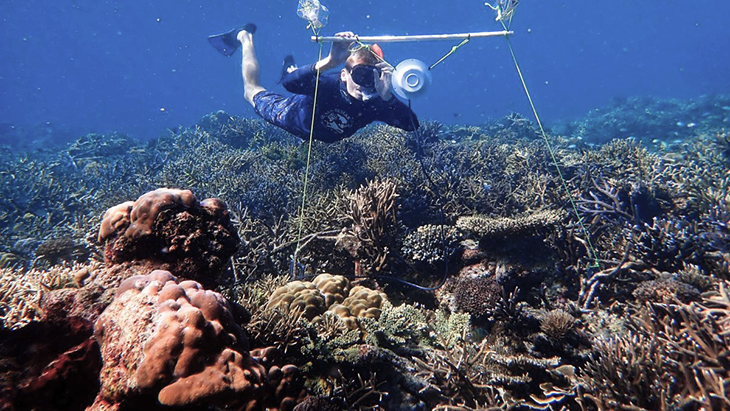
The result of dead coral reefs and miles of destroyed coral ecosystems across the world’s oceans from a devastating impact of rapidly changing ocean temperatures, to the sea levels rising, extreme pollution and overfishing is one of the major nightmares the world is experiencing. All this has resulted from human actions and scientists are trying to discover ways to revive them.
The largest living coral ecosystem in the world, the Great Barrier Reef in Australia’s coast has been experiencing a slow death, with a huge percentage of the corals dying one after another, while the rest that remain are transforming into bleached, lifeless rocks.
But now, scientists have unlocked a new discovery wherein they can restore life to dead patches of corals in the Great Barrier Reef. How did they achieve this ingenious way? They play ambient sounds of nature in loudspeakers in order to lure fish to the area that needs reviving. The fish in turn, help clean up the reef, which eventually allows new growth of corals that recover the reef ecosystems.
For a while now, scientists have been concerned with the deadly silence that surrounds areas with damaged coral reefs. Once a place vibrating off a healthy marine life with the sounds of fish, shrimp and other reef residents, without this ambiance, fish just avoid entering the dead zones.

A research team of marine biologists form the University of Exeter set up a submarine loudspeaker system that can play recordings of how healthy reefs sound in order to attract fish to enter dead coral patches in the Lizard Island located in the Great Barrier Reef. The results of this experiment were published in the scientific journal Nature Communications, and they were incredibly amazing.
As seen in a press release by the University of Exeter:
“The study found that broadcasting healthy reef sound doubled the total number of fish arriving onto experimental patches of reef habitat, as well as increasing the number of species present by 50 percent.”
Marine biologist Tim Gordon was the lead author of the study and he said:
“Fish are crucial for coral reefs to function as healthy ecosystems … Boosting fish populations in this way could help to kick-start natural recovery processes, counteracting the damage we’re seeing on many coral reefs around the world.”

Steve Simpson, another marine biologist at the University of Exeter who co-authored the study also mentioned:
“Healthy coral reefs are remarkably noisy places—the crackle of snapping shrimp and the whoops and grunts of fish combine to form a dazzling biological soundscape. Juvenile fish home in on these sounds when they’re looking for a place to settle. Reefs become ghostly quiet when they are degraded, as the shrimps and fish disappear, but by using loudspeakers to restore this lost soundscape, we can attract young fish back again.”
The loudspeaker experiment was running for six weeks and provided more than one solution to restore and protect the planet’s dying coral reefs. Although broadcasting recordings of healthy reefs won’t necessarily resurrect the dead patches, restoration efforts and action to halt climate change are crucial tools in saving the Great Barrier Reef.
“Acoustic enrichment is a promising technique for management on a local basis.
If combined with habitat restoration and other conservation measures, rebuilding fish communities in this manner might accelerate ecosystem recovery.
However, we still need to tackle a host of other threats including climate change, overfishing and water pollution in order to protect these fragile ecosystems,” co-author from the University of Bristol, Andy Radford noted.
What are your thoughts? Please comment below and share this news!
True Activist / Report a typo


